4 Signs of a Socially Awkward Child

- Avoiding eye contact is an early sign of socialization problems.
- Children with delayed language development may have more social difficulties.
- Some children struggle to understand social cues and body language.
- Being socially anxious or having learning differences may make it hard for children to make friends.
- Early intervention can help a child who is struggling socially.
There’s something special about watching your child thrive in social situations. Most parents anxiously await the first invitation to a friend’s birthday party and hope that their child makes friends easily when they head to their first day of school.
Since children behave quite differently than adults, it can sometimes be hard to tell whether a child is truly awkward, or if they are simply still figuring out the best way to interact with other children.
Parents of children with anxiety disorders, autism spectrum disorders, or mental health issues should pay extra close attention to how well their child is interacting with other kids around the same age.
Parents who identify early signs of a socially awkward child can get their little one into early intervention or therapy to help their child learn to develop healthy relationships with others. There are several signs that indicate a child may need the help of a professional to overcome their challenges with relating to their peers, teachers, and family members.
1: Avoids Eye Contact
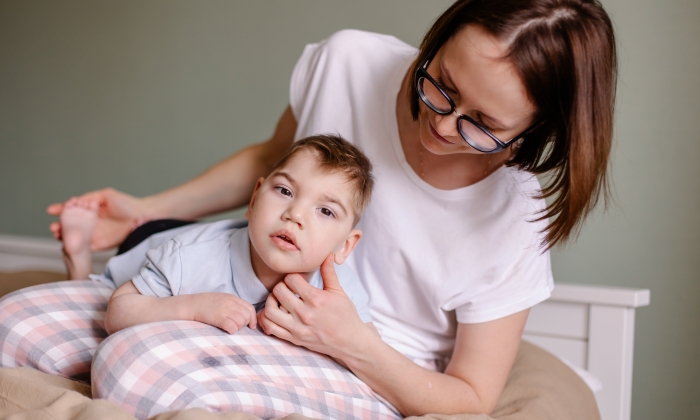
Eye contact is one of the earliest signs of social interaction that parents will notice in their child. Most babies begin to focus on a person talking to them and are able to make eye contact between three and six months of age. According to Autism Speaks11. Early signs of autism. Autism Speaks. https://www.autismspeaks.org/signs-autism, children who do not make eye contact by 9 months of age should be evaluated for other signs of autism spectrum disorder.
Older children who made eye contact as infants but cannot maintain eye contact as they get older may be struggling with social anxiety disorder. They may also struggle with low self-confidence.
2: Struggles With Verbal Communication

Children should start participating in reciprocal conversation, meaning they respond when spoken to, around 6 months of age. If your baby does not respond to her name or babble back and forth with you by 12 months old, you may want to seek professional help.
Children may have a hard time talking for a variety of reasons. Trouble with conversation skills can be caused by:
- Hearing problems
- Autism spectrum disorder
- Cognitive delays
- Oral impairments like cleft palate
- Extreme shyness
A delay in language or speech is not always caused by an underlying medical problem. Some children are just less interested in social interaction than others.
If you have a naturally shy child, try to ease them into social interactions at family gatherings or play dates with other children. Many parents find that their child’s vocabulary increases significantly when they spend more time with their peers in daycare or preschool.
Experts at Nemours Children’s Health22. Hartnett, J. K.. Delayed Speech or Language Development. KidsHealth. 2022. https://kidshealth.org/en/parents/not-talk.html suggest reading to your child as a way to help them expand their vocabulary and improve their speech.
3: Displays Limited Understanding of Social Cues
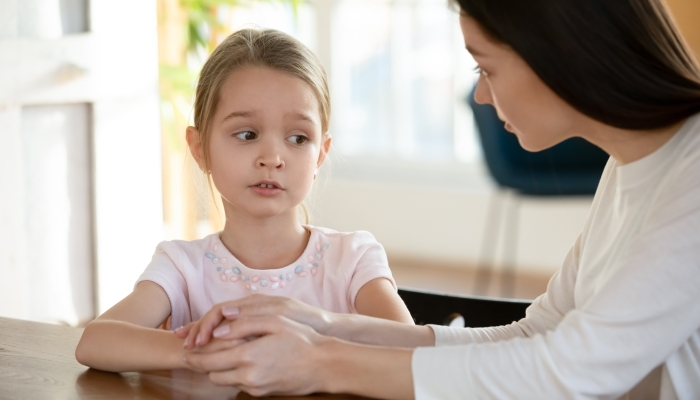
Understanding social cues is a learned behavior. Most adults can tell how another person is feeling simply by looking at their facial expressions, reading body language, and listening to their tone of voice. Children are more likely to have concrete thinking and miss social cues or changes in tone.
The British Psychological Society33. Jarrett, C.. At what age do children recognise the difference between sarcasm and irony? The British Psychological Society. 2010. https://www.bps.org.uk/research-digest/what-age-do-children-recognise-difference-between-sarcasm-and-irony explains that children may not be able to correctly identify sarcasm or irony until they are nine years old. However, children as young as five can identify teasing in a tone of voice, and children as young as three are able to identify facial expressions conveying sadness, anger, and happiness.
Just like all other skills, understanding social cues takes practice. Practice observation with your children and take time to point out different behaviors in yourself and others. You may even watch a movie with your child and pause to discuss the different characters’ behavior and guess how they might be feeling.
4: Shows Difficulty in Making Friends
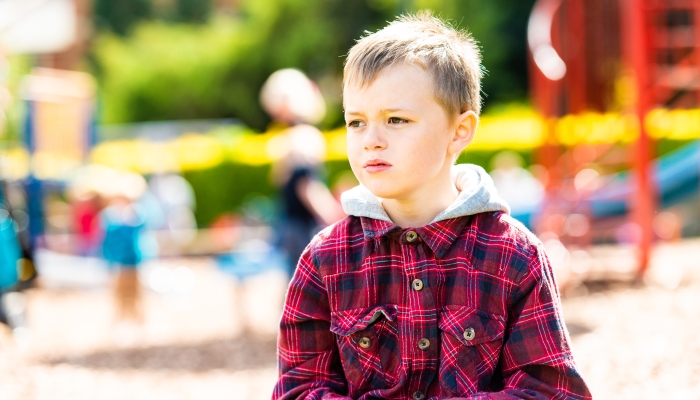
Socially awkward children often have difficulty in making friends. It can be hard for parents to watch their children panic during birthday parties or refuse to play with other kids at the playground. Even though it can feel frustrating, patience and empathy can go a long way in helping your child build the confidence they need to make friends and interact with their peers.
Before you start to worry about how your child interacts with others, make sure that you understand typical social-emotional development timelines. The Warren Center44. Stages of Social and Emotional Development. The Warren Center. https://thewarrencenter.org/help-information/social-emotional/stages-of-social-and-emotional-development explains how children of different ages should begin to interact with others:
- 2 months old: tries to look at their parent
- 4 months old: smiles and makes eye contact
- 6 months old: reacts to the emotions of others
- 9 months old: develops a fear of strangers and separation anxiety
- 12 months old: enjoys social games like peek-a-boo
- 18 months old: shows affection towards familiar people and plays pretend games
- 2 years old: shows concern for a crying loved one and participates in parallel play
- 4 years old: learns to cooperate with other children and plays with them instead of just near them
- 5 years old: shows sympathy for others and enjoys being with friends
- 8–10 years old: children develop close friendships based on shared interests
- 10–15 years old: cliques and bullying become more common, and an understanding of romantic love develops
FAQs
How can parents distinguish between a phase and a persistent issue of social awkwardness?
It can be hard for parents to tell whether a child is simply experiencing a learning phase or if they truly struggle with social awkwardness. Children who generally follow the normal developmental social-emotional milestones are probably just experiencing a phase of awkwardness.
If your child consistently has trouble relating to others, is several months or years behind on social developmental milestones, or displays extreme behaviors in social settings, they may need the help of a professional.
How do I handle my child’s social awkwardness in public settings?
Handling social awkwardness in public settings depends on the severity of the problem and the underlying cause. A child with autism spectrum disorder or attention deficit hyperactivity disorder may need to be removed from the situation until they can calm down. A child with social anxiety may need gentle encouragement and support to continue in a social interaction.
If your child is simply having an awkward moment, the best option might be to let them work through it on their own. Unless they’re extremely distressed, invading another person’s personal space, or hurting someone’s feelings, children should be allowed to work through their awkwardness and practice interaction with others.
How does social awkwardness differ from social anxiety in children?
If you’re unsure whether your child is struggling with social awkwardness or social anxiety, talk to them about how they are feeling before and after a social interaction. Children who are awkward may not even notice that they act inappropriately in social situations. Children who are anxious often overthink every social interaction and may complain of stomachaches, worry, or become tearful in different social situations.
How can I help my child manage their social awkwardness?
For most children, social awkwardness fades over time. It may take some children longer than others to understand different social cues, how to act in specific situations, and how to relate to other children and adults.
If your child struggles to make friends, behave in school, or interact with family members, help them practice their conversation skills in a low-stress and judgment-free environment. Setting up playdates, enrolling them in extracurricular activities, and signing up for group activities can help.
References
- Early signs of autism. Autism Speaks. (n.d.). https://www.autismspeaks.org/signs-autism
- Hartnett, J. K. (Ed.). (2022, March). Delayed Speech or Language Development. KidsHealth. https://kidshealth.org/en/parents/not-talk.html
- Jarrett, C. (2010, February 22). At what age do children recognise the difference between sarcasm and irony? The British Psychological Society. https://www.bps.org.uk/research-digest/what-age-do-children-recognise-difference-between-sarcasm-and-irony
- Stages of Social and Emotional Development. The Warren Center. (n.d.). https://thewarrencenter.org/help-information/social-emotional/stages-of-social-and-emotional-development
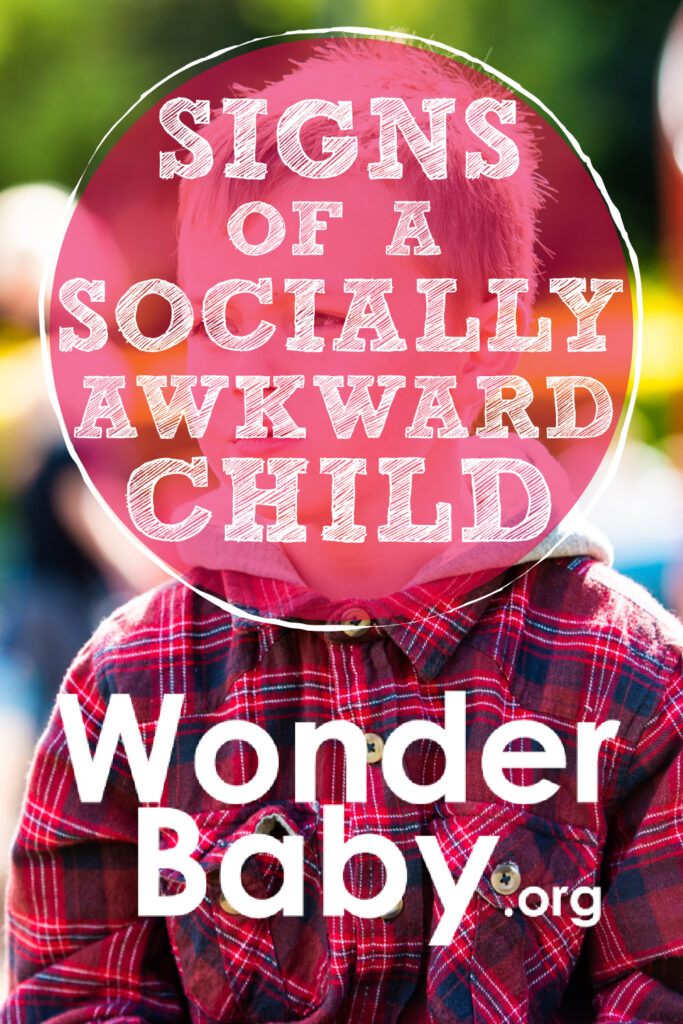
The information WonderBaby provides is not intended to be, and does not constitute, medical or other health advice or diagnosis and should not be used as such. Always consult with a qualified medical professional about your specific circumstances.
Related Posts
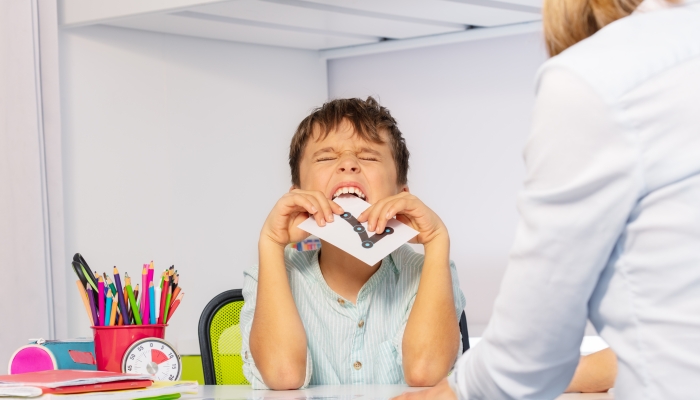
Behavior
Understanding Intermittent Explosive Disorder in Children
Are you worried about your child’s unexpected aggression and explosive behaviors? Learn how to support a child with intermittent explosive disorder.

Behavior
5 Emotional Regulation Activities for Kids
Want to teach your child how to regulate emotions? Here are emotional regulation activities for kids that can help!

Behavior, Special Needs
5 Tips for Dining Out with Children Who Have Sensory Sensitivities
Worried about dining out with sensory sensitivities? Try these tips for less stress and more fun the next time you take your family out to eat.